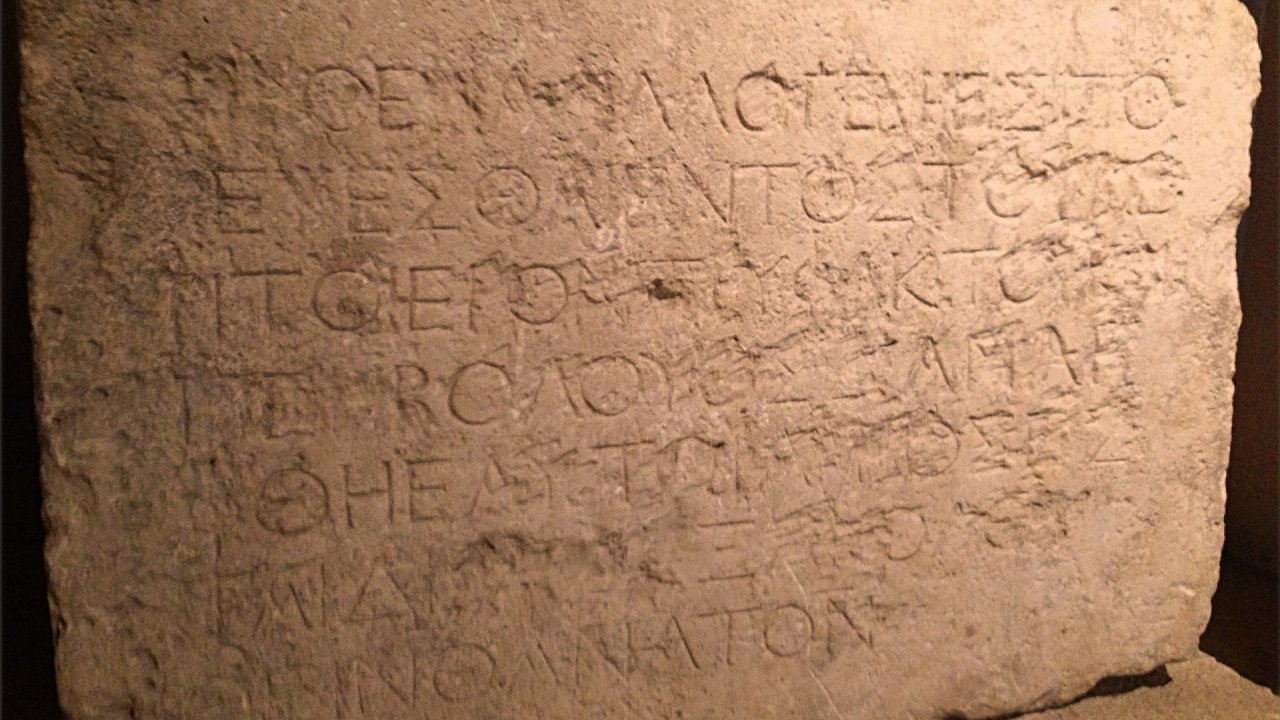
Editor’s note: This post originally appeared on davidwilber.me. Tabernacle of David considers this ministry trustworthy and Biblically sound.

Author: David Wilber
In his letter to the Ephesians, Paul expressed that Gentile believers used to be excluded from the people of Israel. But now, in Christ, they have become fellow citizens and members of God’s household (Ephesians 2:11-13, 19). Why were these Gentile believers excluded from the people of Israel, and what did Christ do to include them? Paul explains that there was a “dividing wall of hostility” that existed between Jew and Gentile, which Christ broke down:
For he himself is our peace, who has made us both one and has broken down in his flesh the dividing wall of hostility by abolishing the law of commandments expressed in ordinances, that he might create in himself one new man in place of the two, so making peace, and might reconcile us both to God in one body through the cross, thereby killing the hostility.
—Ephesians 2:14-16
So, Christ broke down the wall of division between Jew and Gentile “by abolishing the law of commandments expressed in ordinances,” and this allowed the Gentile believers to be included in the people of Israel. But what does Paul mean by this phrase? Some understand the “law of commandants expressed in ordinances” as a reference to the Torah, or Law of Moses. It is argued that the Law of Moses was the source of division between Jew and Gentile, so Christ had to abolish it. These comments from R. L. Solberg, an outspoken critic of Pronomian (pro-law/Torah) theology, are representative of this perspective:
And what do you suppose the phrase “the law of commandments expressed in ordinances” would have meant to Paul’s first-century Jewish audience? It is an unambiguous reference to the Mosaic Law, under which the Jewish people had been living for 1,500 years. And what does the text say Jesus did to that law? He abolished it.[1]
Is this phrase in Ephesians 2:15 really an “unambiguous reference to the Mosaic Law”? That seems unlikely for a few reasons.
First, in Matthew 5:17-20, Jesus prohibited his listeners from even thinking that he came to abolish the Mosaic Law. He further stated that not even the smallest part of the law would pass away until heaven and earth disappear and all is accomplished—that is, until the consummation of the kingdom at the end of the age, when the present created universe passes away (cf. 2 Pet. 3:7, 13; Rev. 21:1). Moreover, Jesus instructed his followers to do and teach even the least of the Torah’s commandments. Why would Paul say that Jesus did something that Jesus himself said he did not come to do?
Second, Paul himself affirmed the ongoing validity of the Torah. In 2 Timothy 3:16, Paul declared that “all Scripture” is profitable for training in righteousness. He further stated that one’s faith does not nullify but instead establishes the Torah (Romans 3:31) and that the Holy Spirit empowers believers to fulfill the Torah’s righteous requirements (Romans 8:4). In Ephesians itself, Paul quotes a commandment from the Torah as authoritative instruction for his readers (Ephesians 6:3; cf. Exodus 20:12). These statements are not what we would expect from someone who believed that Christ abolished the Law of Moses.
Third, there is nothing inherent in the Law of Moses that causes division between Jew and Gentile. The Torah repeatedly states that any Gentile who desires to join the people of God is to be treated as a native Israelite and given the full blessings and responsibilities that come with being a covenant member. (See Exodus 12:19, 48; 20:10; Leviticus 16:29; 17:8-9; 22:17-18, 31; Numbers 9:14; 15:14-16; Deuteronomy 5:14; 16:10-14; 26:5-11; 29:1, 9-15; 31:12; Joshua 8:30-35.) Thus, the Torah itself does not seem to fit Paul’s characterization of “the law of commandments expressed in ordinances.”
Given these facts, it seems unlikely that Paul is referring to the Torah itself in Ephesians 2:15. But if the “law” in this verse is not a reference to the Law of Moses, what is Paul referencing? Notice that the word “law” is qualified by the constructions “of commandments” (τῶν ἐντολῶν) and “expressed in ordinances” (ἐν δόγμασιν). According to New Testament scholar Lionel Windsor, these qualifications make a significant impact on how this phrase should be understood:
[T]he qualifications perform more than a descriptive function. Rather, they perform a defining function: they specify what would otherwise be ambiguous. In other words, the qualifications indicate that what has been abolished is not necessarily the law in every sense, but rather the law as understood and used in a certain way: “the law of the commandments in decrees.”[2]
Indeed, in this passage, Paul seems to be speaking of a particular use (or more accurately, a misuse) of the Torah. The word translated “commandments” sometimes refers to man-made orders. John 11:57 uses this term to refer to the “orders” given by the Pharisees. Acts 17:15 uses this term to refer to Paul’s “command” for Silas and Timothy to come to him. Moreover, the word translated as “ordinances” almost exclusively refers to the decrees of earthly leaders or rulers (e.g., Luke 2:1; Acts 16:4; 17:7).
In light of these qualifications, it makes more sense to interpret this phrase in Ephesians 2:15 as referring to extrabiblical rulings and teachings developed from a misapplication of the Torah. That is what the Messiah abolished, not the Torah itself. One example of a man-made law that created division between Jew and Gentile is the prohibition against Jews and Gentiles eating together. The Torah never commands that Jews and Gentiles must eat separately, but Jewish texts like the book of Jubilees did (Jubilees 22:16). Some of the Jewish groups that confronted the apostles held to this same unbiblical and divisive tradition (Acts 11:3; Galatians 2:11-14). Such traditions were based on misapplications of the Torah, and these man-made laws needed to be abolished because they created hostility between Jew and Gentile.
This more nuanced perspective on the phrase “the law of commandments expressed in ordinances” makes sense in light of the historical background of Paul’s letter. In the Second Temple, a wall was constructed that literally separated Jews and Gentiles and restricted Gentiles from the more “sacred” parts of the temple precincts. Paul was likely alluding to this wall when he spoke of the “dividing wall of hostility.” Josephus records that this wall included an inscription that imposed a death sentence upon any foreigner who entered spaces that were “forbidden” to them (Josephus, Antiquities 15.417; Jewish Wars 5.193-94; 6:124-26). As Windsor notes, this inscription “fits well with the definition of a ‘decree’ (δόγμα),” or ordinance.[3]
Again, it is essential to recognize that God did not command this wall in the temple to be built. In fact, he allowed any foreigner who desired to draw near to him the same access to his presence that the native Israelites had (Numbers 15:11-16). Men built this wall to restrict Gentiles from God’s presence. Significantly, the logic behind constructing this wall is based on a misapplication of Numbers 1:51, which commands the Levites to execute any outsider who comes near the tabernacle. This command in Numbers was intended to prevent anyone from approaching the tabernacle in an unauthorized way, but Jewish leaders in the first century misapplied this commandment to prohibit Gentiles from fully participating in worship at the temple. Given this background, it seems clear that, for Paul, what has been “abolished” are these types of extrabiblical and divisive rulings, not the Torah itself. Windsor provides an excellent summary of this point:
[W]hat has been abolished is the law understood primarily as a set of “commandments” as expressed and promulgated by certain authoritative “decrees” concerning the observance of these commandments. The law understood in this way had indeed produced hostility between Jews and gentiles—as illustrated by the officially sanctioned inscription at the dividing-wall in the temple. This is what Paul is claiming to have been abolished by Christ. Paul is not denigrating the law itself, nor is he ruling out any possible attempt to apply the law to the lives of believers. This is confirmed by the fact that Paul later quotes a Mosaic “commandment” as the basis for moral instruction of gentile believers, noting that it is (literally) “[the] first commandment in promise” (ἐντολὴ πρώτη ἐν ἐπαγγελίᾳ, Eph 6:2). The “promise” in view here involves Israel’s inheritance of the promised land (Eph 6:3), an inheritance in which the gentiles have also come to have a share (Eph 1:13-14; 3:6, cf. 2:12).[4]
In conclusion, it is unlikely that Ephesians 2:15 says that Christ abolished the Law of Moses. Both Jesus and Paul affirm the Torah’s ongoing validity elsewhere. Also, there is nothing inherent in the Torah itself that would cause division between Jewish and Gentile believers. Thus, more likely, Paul is referring to extrabiblical rulings based on misapplications of the Torah as having been abolished. This conclusion is based on the fact that the term “law” is qualified by the constructions “of commandments” (τῶν ἐντολῶν) and “expressed in ordinances” (ἐν δόγμασιν), which function to define the “law” more specifically as a particular understanding and use of the law. Based on how he characterizes this “law of commandments expressed in ordinances,” Paul likely has in mind the man-made laws of his time that served to divide Jew and Gentile. This interpretation makes more sense in light of the historical context of Paul’s letter and Paul’s precise verbiage.
Sadly, contrary to Paul’s teaching in Ephesians 2, it seems that many modern believers wish to reconstruct the old wall of hostility between Jews and Gentiles. Some misapply the Torah to exclude Gentiles in various ways. For example, many will say that the Sabbath and festivals are only for Jews and that Gentiles are not expected to participate in worshiping God the way he prescribes in the Torah. Some organizations will put out official statements that outright discourage Gentiles from following the Torah’s commands. Such man-made traditions and decrees fly directly in the face of the Torah, Prophets, and New Testament writings. Paul says that Gentiles who are in Messiah are full members of the commonwealth of Israel. Far be it from anyone to exclude those whom God has welcomed!
[1] R. L. Solberg, Torahism: Are Christians Required to Keep the Law of Moses? (Franklin, TN: Williamson College Press), 86.
[2] Lionel J. Windsor, Reading Ephesians and Colossians after Supersessionism: Christ’s Mission Through Israel to the Nations (Eugene, OR: Cascade Books, 2017), 136-137.
[3] Ibid.
[4] Ibid., 139-140.
IMAGE: Jerusalem Temple Warning
ΜΗΟΕΝΑΑΛΛΟΓΕΝΗΕΙΣΠΟ
ΡΕΥΕΣΘΑΙΕΝΤΟΣΤΟΥΠΕ
ΡΙΤΟΙΕΡΟΝΤΡΥΦΑΚΤΟΥΚΑΙ
ΠΕΡΙΒΟΛΟΥΟΣΔΑΝΛΗ
ΦΘΗΕΑΥΤΩΙΑΙΤΙΟΣΕΣ
ΤΑΙΔΙΑΤΟΕΞΑΚΟΛΟΥ
ΘΕΙΝΘΑΝΑΤΟΝ
Translation: “Let no foreigner enter within the parapet and the partition which surrounds the Temple precincts. Anyone caught [violating] will be held accountable for his ensuing death.”
About David Wilber

David is first and foremost a passionate follower of Yeshua the Messiah. He is also a writer, speaker, and teacher.
David’s heart is to minister to God’s people by helping them rediscover the validity and blessing of God’s Torah and help prepare them to give an answer to anyone who asks about the hope within them (1 Peter 3:15)…

